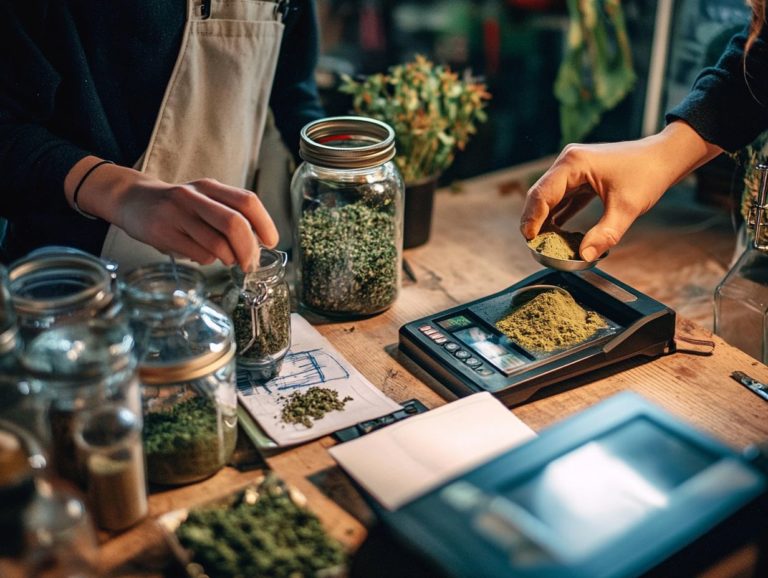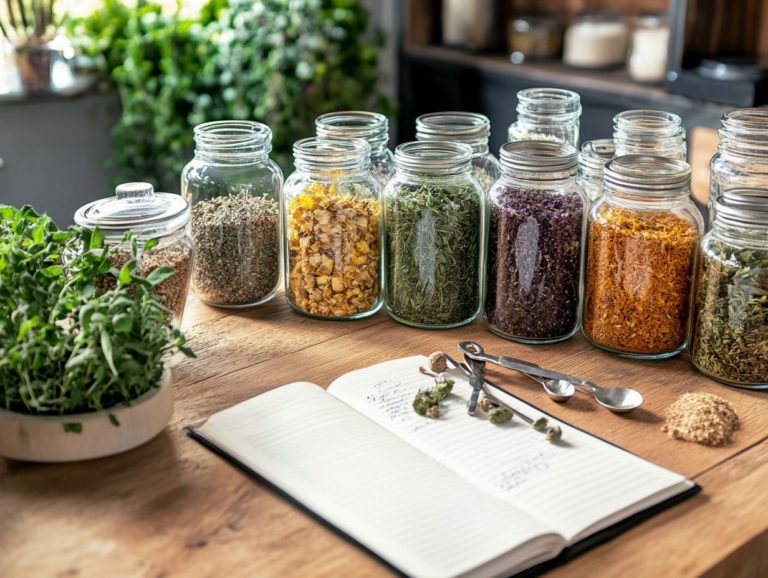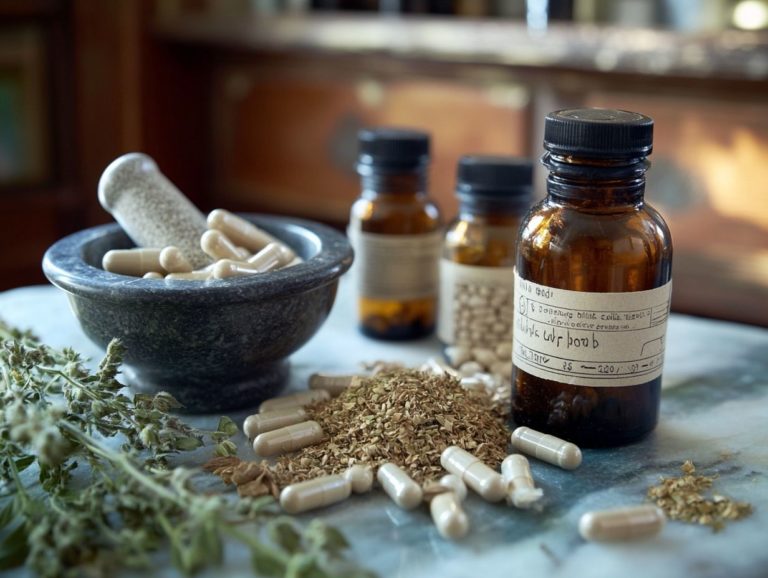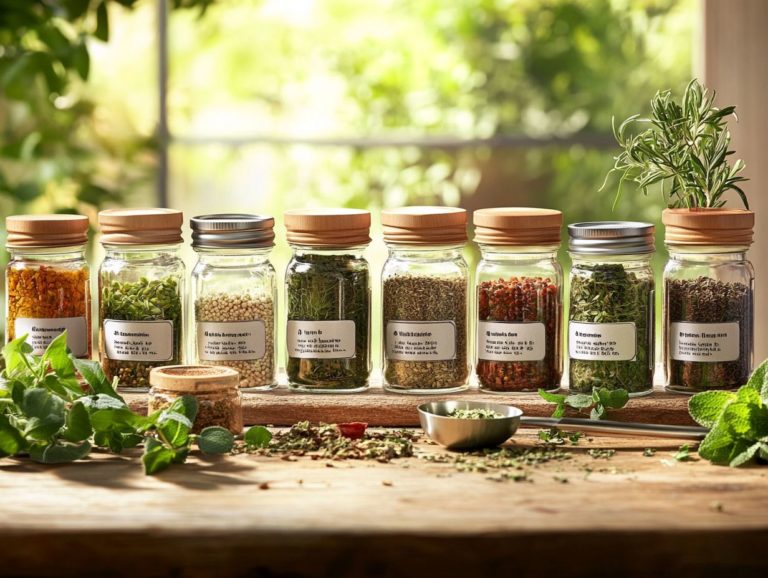Herbal Dosage for Mental Health Support
In your pursuit of mental well-being, you may find yourself drawn to herbal supplements, including popular alternatives like St. John’s wort, as a natural alternative to traditional treatments.
Understanding the appropriate herbal dosage is essential for maximizing the health benefits while minimizing any potential risks associated with dietary supplements. This article delves into popular herbs and herbal remedies known for their mental health support, guiding you in selecting the right dosage and discussing possible side effects and interactions.
You will also discover how to seamlessly integrate herbal treatments with conventional medicine, along with practical strategies for incorporating these supplements into your daily routine.
Whether you re an experienced herbal enthusiast or just beginning your journey into alternative treatments, this guide will give you the tools and confidence to navigate the world of herbal dosage.
Contents
- Key Takeaways:
- Common Herbal Supplements for Mental Health
- Choosing the Right Dosage
- Potential Side Effects and Interactions
- Combining Herbal Dosage with Other Treatments
- Tips for Incorporating Herbal Dosage into Daily Routine
- Frequently Asked Questions
- Common Herbs for Mental Health Support
- How Does Herbal Dosage Support Mental Health?
- Is There a Recommended Dosage?
- Are There Risks with Herbal Dosage?
- Can Herbs Replace Traditional Treatments?
Key Takeaways:
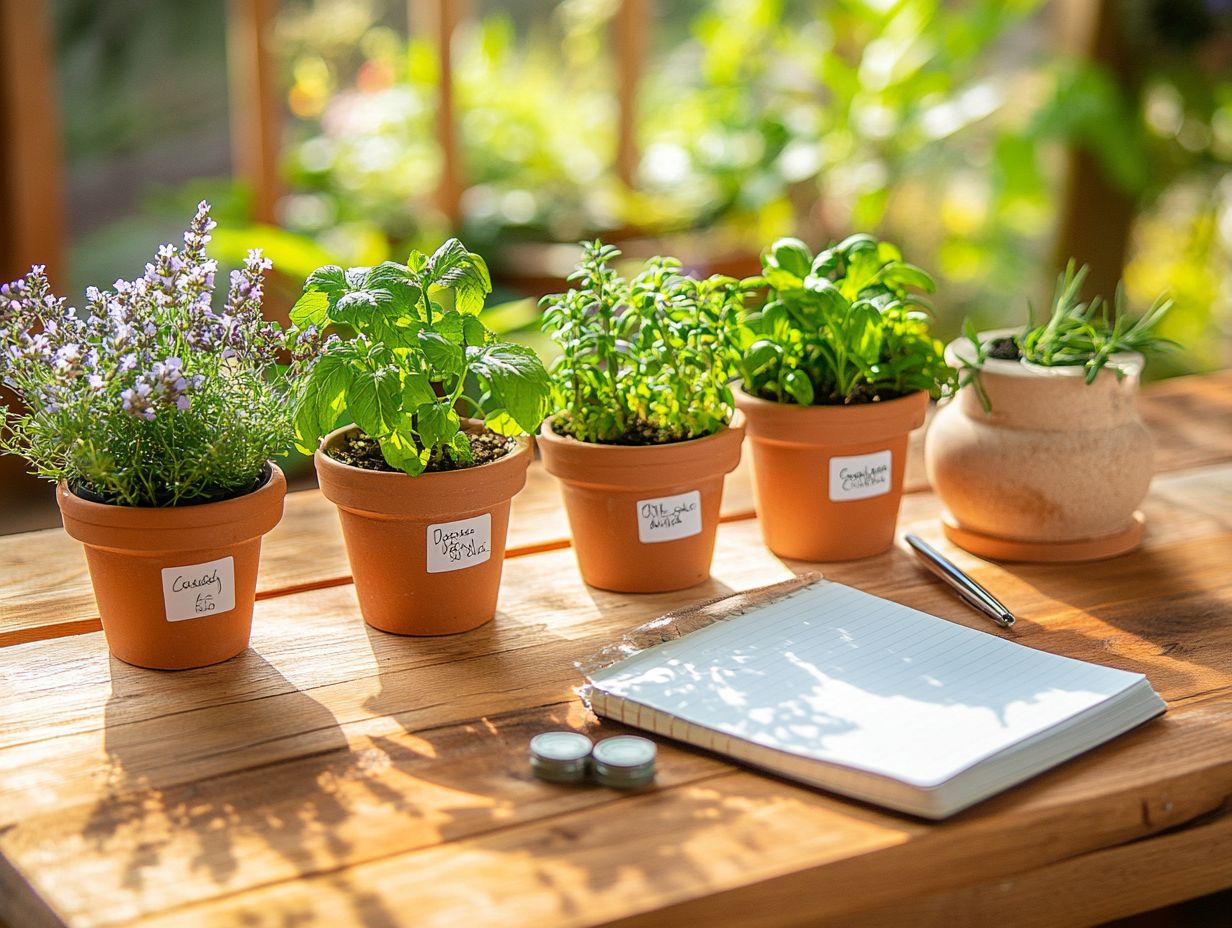
- Herbal dosage can be an effective form of support for mental health, but it is important to choose the right dosage for each individual’s needs and considerations.
- Understanding the side effects and potential interactions is crucial when adding herbal supplements to your routine!
- Integrating herbal dosage with traditional medicine can provide a holistic approach to mental health support, and incorporating it into daily routines can help create consistency and maximize its benefits.
Common Herbal Supplements for Mental Health
Common herbal supplements for mental health, such as St. John’s wort, have gained considerable attention as alternative treatments for both mild depression and major depression.
Various dietary supplements, supported by clinical studies from institutions like the Mayo Clinic and National Institutes of Health, indicate a promising role in managing mental health disorders, underscoring the importance of scientific evidence in validating their health benefits.
While St. John’s wort is among the most thoroughly researched herbal remedies, you ll also find that other options like omega-3 fatty acids, S-adenosylmethionine (SAMe) a compound naturally found in the body that may help improve mood and 5-HTP show potential efficacy in enhancing overall mental well-being.
Overview of Popular Herbs
An overview of popular herbs for mental health reveals some interesting options, starting with St. John’s wort, or Hypericum perforatum, and its potential interactions with other medications. This herb has been thoroughly researched for its effectiveness in addressing mild to moderate depression. You ll also want to consider other noteworthy herbs like ginseng, chamomile, lavender, and saffron. Each of these brings unique benefits to the table, potentially alleviating symptoms tied to anxiety, cognitive dysfunction, and enhancing emotional stability.
Take ginseng, particularly Panax ginseng; its potential benefits extend beyond just boosting physical energy. Some studies suggest it might also play a role in elevating mood and reducing stress levels.
Chamomile is another gem, known for its calming properties, which can lead to improved sleep quality ideal for anyone grappling with insomnia related to anxiety and its associated side effects.
Then there s lavender, whose soothing aroma has been shown in clinical settings to lower anxiety and enhance emotional well-being, making it a popular choice for those seeking herbal remedies. And let s not overlook saffron, often deemed a luxurious spice; clinical studies have highlighted its antidepressant properties, making it an appealing alternative treatment for those seeking natural alternatives to traditional medications.
Each of these herbs presents a holistic approach to mental wellness, offering potential benefits for anyone in need.
Remember to consult a healthcare provider for personalized advice on herbal supplements to ensure you are making the best choices for your mental health.
Choosing the Right Dosage
Selecting the right dosage of herbal supplements is key to maximizing benefits and reducing side effects. Some supplements, like St. John s wort, have established dosages based on clinical trials that highlight the balance between effectiveness and safety.
Omega-3 fatty acids show great promise in mental health treatment. The right dosage can help you achieve the health benefits you seek!
Factors to Consider
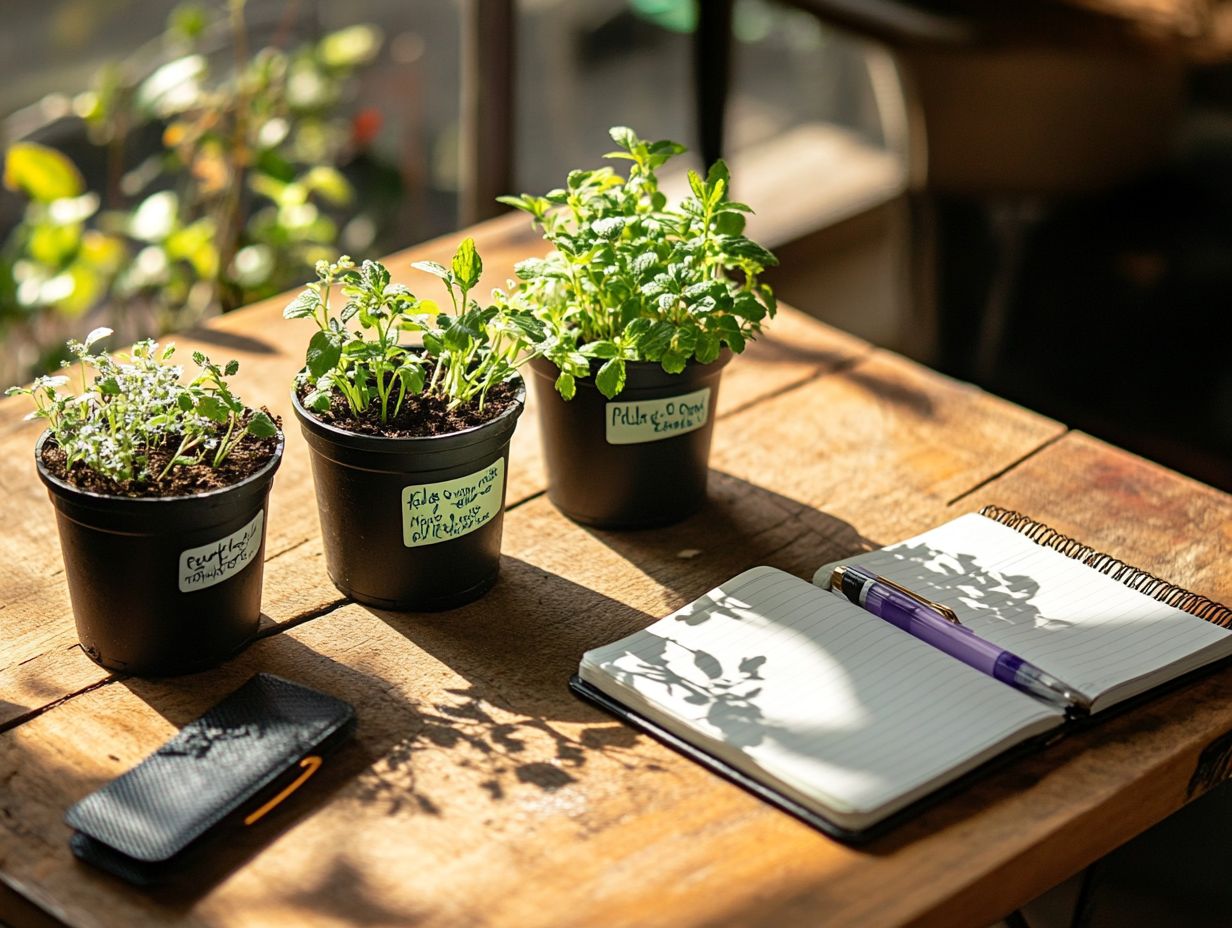
When determining the dosage of herbal supplements, consider several factors. These include potential side effects, interactions with medications, and the chance of placebo effects.
Clinical studies highlight the placebo effect, emphasizing the need to evaluate your individual responses to herbal remedies. By understanding these factors, you can make informed choices that prioritize safety and effectiveness in managing your mental health with herbal medicines.
Your age, weight, overall health, and any existing medical conditions significantly influence the right dosage for herbal remedies. For example, St. John s Wort, often used for depression, can interact with SSRIs a type of medication used to treat depression leading to serotonin syndrome, which can be serious.
Similarly, Ginkgo Biloba might affect blood clotting, making it unsuitable for those on anticoagulants who manage mental health disorders.
Therefore, consulting healthcare professionals before starting herbal treatments is essential. They can provide personalized dosages and alert you to any adverse interactions, ensuring a safe approach to your mental health care through herbal remedies.
Potential Side Effects and Interactions
When considering herbal remedies for mental health, evaluate potential side effects and drug interactions. These factors directly affect the safety and effectiveness of your treatment.
For instance, St. John’s Wort may interact with certain antidepressants, leading to a serious condition called serotonin syndrome. Understanding these risks is vital for the safe use of dietary supplements and herbal medicines.
As noted by the National Center for Complementary and Alternative Medicine, this awareness is important for your wellness journey.
Precautions and Risks
Taking precautions is crucial when adding herbal remedies to your mental health care. Understanding potential risks like serotonin syndrome helps ensure your safety.
Some herbs, like St. John s Wort, can interfere with antidepressants, leading to unintended side effects. Similarly, valerian root, often used for anxiety, may increase drowsiness when combined with certain sedatives.
Communicate openly with your healthcare provider to navigate these complexities. Being aware of your health conditions is equally important, as some herbs may pose risks for individuals with specific allergies or chronic illnesses.
This careful consideration enhances your well-being and paves the way for a more informed, holistic approach to healing. Empower yourself with knowledge and stay safe on your health journey!
Combining Herbal Dosage with Other Treatments
Combining herbal dosages with other treatments can significantly enhance therapeutic outcomes. This is especially true in integrative medicine, which combines traditional and modern practices supported by scientific evidence.
The integration of herbal remedies and dietary supplements, such as Klaire Labs and RVO Health, has gained recognition for supporting the treatment of mental health disorders. This fosters a more holistic approach to wellness.
Understanding how to blend these methods effectively, including ginseng and ashwagandha, can help you optimize treatment strategies and improve patient well-being.
Integration with Traditional Medicine

Integrating herbal remedies with traditional medicine requires careful consideration and a good understanding of clinical studies that demonstrate their effectiveness, particularly the role of scientific evidence.
Many dietary supplements, like St. John’s wort and SAMe, have shown potential benefits in addressing various mental health disorders. This makes collaboration between herbal and traditional approaches increasingly relevant and can offer you a holistic treatment strategy tailored to your needs, including herbs for improving mental clarity.
For example, a study published in a leading psychiatric journal revealed that combining St. John’s wort with conventional antidepressants significantly improved depressive symptoms in some individuals. This confirms its status as a leading herbal remedy.
Incorporating ashwagandha, known for its adaptogenic properties, into anxiety treatment plans can enhance your emotional stability while potentially reducing the side effects of prescription medications.
By utilizing evidence-based herbal options alongside cognitive behavioral therapy, you can embrace a multi-faceted approach to mental health care. Incorporating herbal teas for enhanced cognitive function in this approach not only leads to better outcomes but also enhances overall patient satisfaction and well-being.
Tips for Incorporating Herbal Dosage into Daily Routine
Incorporating herbal dosage into your daily routine can truly change your life for the better! Especially with guidance from resources like the National Center for Complementary and Alternative Medicine, utilizing practical strategies can improve consistency and effectiveness.
Establishing a routine that includes herbal remedies and dietary supplements such as St. John s wort or omega-3 fatty acids helps you focus on your mental well-being while reaping the intended health benefits.
Tailoring these strategies to fit your personal lifestyle is crucial for achieving long-term success.
Practical Strategies for Consistency
To achieve consistency in using herbal remedies for mental health, adopt practical strategies. Set reminders or seamlessly incorporate supplements into your daily routines. For example, taking St. John s wort or omega-3 fatty acids at specific times can enhance adherence and maximize their potential benefits.
Utilizing smartphone apps or traditional planners to block out dedicated time for self-care and herbal intake can be very beneficial. Pairing these remedies with existing habits like enjoying a cup of tea in the morning or winding down with herbal tinctures before bed is another effective approach.
Preparing a week’s worth of dosages in advance can eliminate daily decision-making, making integration smoother. Cultivating an environment that supports these practices keeping your products visible and easily accessible can significantly increase the likelihood of maintaining consistency in your regimen.
Frequently Asked Questions
What is herbal dosage for mental health support?
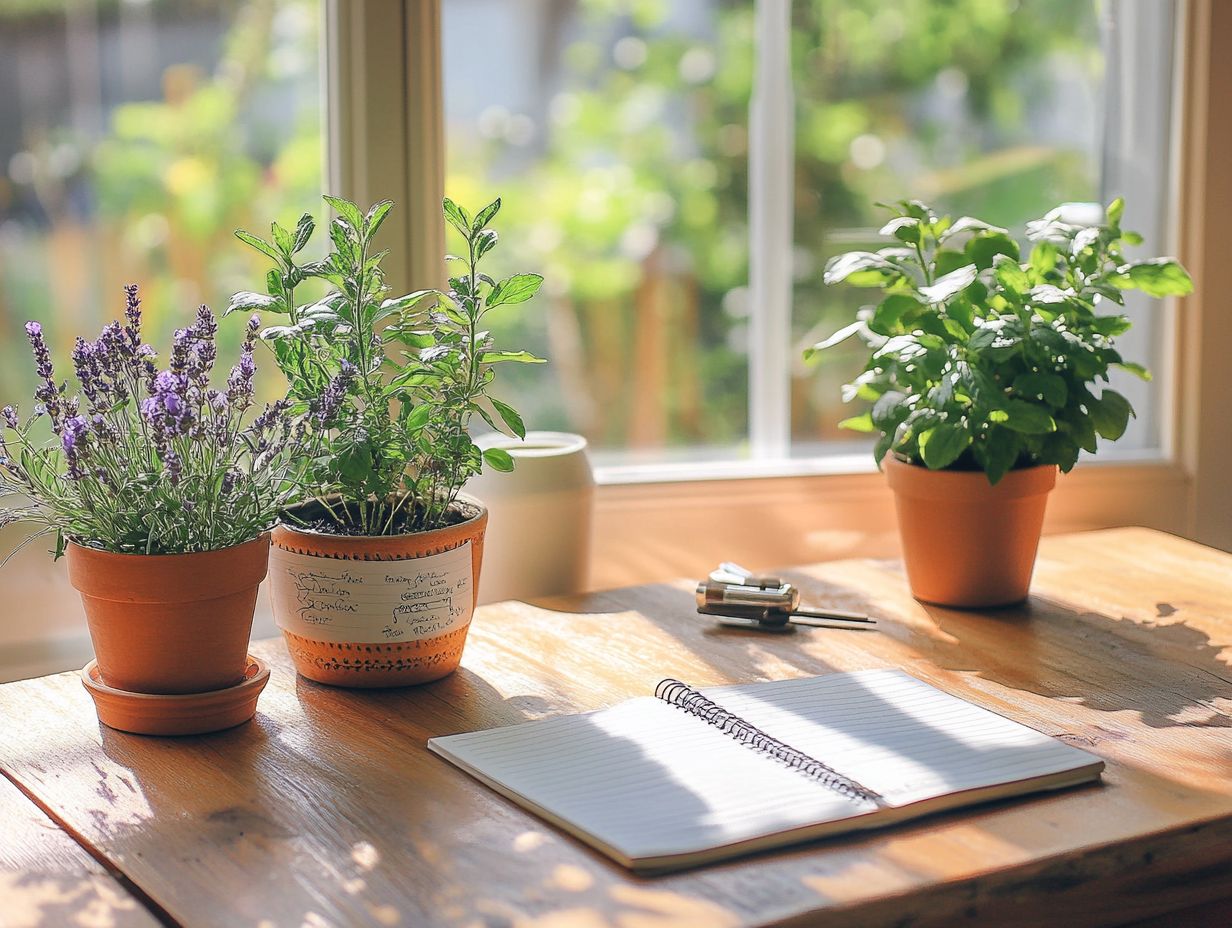
Herbal dosage for mental health support refers to the recommended amount of herbal supplements or remedies to improve mental well-being and alleviate symptoms of mental health disorders.
Common Herbs for Mental Health Support
Popular herbs include St. John’s Wort, valerian root, passionflower, and ashwagandha. Always check with your healthcare provider before starting any herbal supplements.
How Does Herbal Dosage Support Mental Health?
Herbal dosage offers natural remedies that can enhance brain function and reduce stress. They may also help improve overall mood and well-being.
Is There a Recommended Dosage?
Dosages vary based on personal needs and the specific herb. Follow the manufacturer s instructions or consult a healthcare professional for personalized advice.
Are There Risks with Herbal Dosage?
Herbal supplements are generally safe, but they can interact with medications or cause side effects. Always consult with a healthcare professional before trying new supplements.
Can Herbs Replace Traditional Treatments?
No, herbs should complement, not replace, traditional treatments like therapy or medication. Always talk with your healthcare provider before making changes to your treatment plan.

